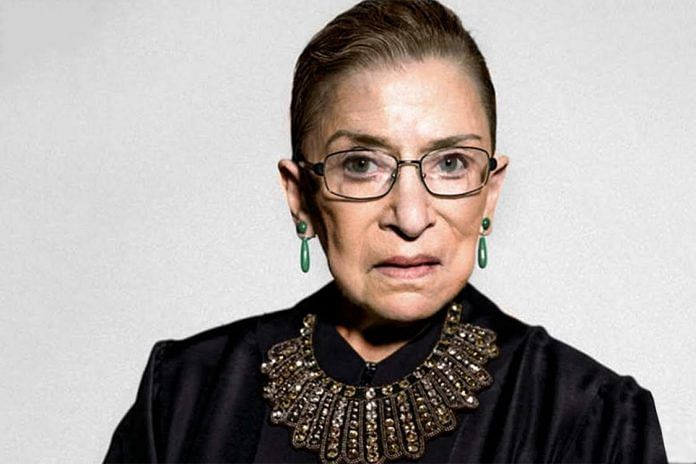Judge Ruth Bader Ginsburg is quite the rage in the United States. She is on T-shirts, phone cases, adult colouring books and children’s books.
Ruth Bader Ginsburg, the 85-year-old US Supreme Court judge known for her powerful dissenting opinions, is also a feminist icon.
The notorious R.B.G is quite the rage. She is on T-shirts, phone cases, adult colouring books and children’s books. And if you didn’t check twice, you wouldn’t know she is the oldest judge in the US Supreme Court. She is a two-time cancer survivor but has no plans for retirement, at least for the next 37 years that Donald Trump would be the president.
In a divided US Supreme Court, tilting towards conservatism, Ginsburg’s voice is louder with every dissent she pens. She has fun with her fame and uses every opportunity, including how she wears her black gown, to further liberal causes.
Last week, just before the landmark ruling in the same sex wedding cake case, her dissent collar was back on, and her gloves off.
Here’s why India needs a Ginsburg in the judiciary.
A female judge who owns her identity
Ginsburg fiercely advocates feminism not only in her judicial opinions, but also off the court. She also owns her feminine identity. Take, for instance, what she has to say about her collection of collars that she wears over her black gown: “The standard robe is made for a man because it has a place for the shirt to show, and the tie”. So, Ginsburg has a collection of collars for each occasion. The most famous one, of course, is her dissent collar, a replica of which is also sold as a necklace.
Compare this with Justice Indu Malhotra’s first public conversation after she was appointed a judge of the Supreme Court. Malhotra, the first woman to have been handpicked from the bar, put the onus on female lawyers to not give men an opportunity to treat them unequally. Dress well at all times, be extra-cautious, she warned.
It is equally disappointing that India’s most celebrated women’s rights lawyer Indira Jaising chimed in with a veiled attempt at moral policing, suggesting female lawyers must dress “professionally”.
The onus of being feminist must not be thrust only on women, given how few women make it to these top posts. But it is legitimate for the younger generations to expect these women to be nothing less than role models.
Even a male Indian Ginsburg will do
India’s Ginsburg need not be a female judge smashing patriarchy or a Dalit judge smashing casteism. A judge who speaks his mind will restore faith in the judiciary.
We can fill the top institutions, including the Supreme Court, with women and minorities, but will that mean an inclusive court? Representation itself may mean very little for the cause unless the representative is true to the cause.
In the last six months, Justice J. Chelameswar made a small attempt in this direction, but his actions are miles away from Ginsburg’s outspokenness.
For one, it always seemed like Chelameswar and his colleagues were dropping subtle hints. The messaging was clear that something was rotten in the functioning of the court, but even he did not take a stand on whether the allegations of corruption against CJI Dipak Misra must be probed. In the historic NJAC ruling, Justice Chelameswar’s dissent did stand out, but that’s perhaps the only such instance in his seven-year tenure in court.
Even the press conference did not move many of Chelameswar’s colleagues and former colleagues to take a stand.
On the other hand, just two weeks ago, Ginsburg wrote in her dissent note that the majority was “egregiously wrong” in deciding that employees cannot go to court for enforcing labour rights when they have contracts with their employers to go in for arbitration.
Indian judges also have veneration for seniority. In the Supreme Court, it is, in fact, a rare sight when a supposedly junior judge speaks out when his senior brother judge is presiding. Justice Rohinton Nariman is one of the few judges who stand out since junior judges don’t even pose questions to the lawyers.
Another recent example is Justice D.Y. Chandrachud’s handling of the Hadiya case. The judge, generally known for his liberal take on civil rights, did not object to an order seeking an NIA probe into the ‘love jihad’ issue when former CJI J.S. Khehar was the presiding judge. It was only later – after Khehar retired and the case was before a bench led by CJI Misra – that Chandrachud pointed out that it was preposterous to let Hadiya’s liberty be violated.
To be fair, Indian judges are routinely criticised when they do speak. After the 12 January press conference, Justice Chelameswar has been asked in every public event if he thought he broke the ethical code of judges when he addressed the media.
But we live in an era when judiciary will be not insulated from question and criticism. The institution must reclaim the conversation on rights and freedom. We need judges who will openly talk about the #MeToo movement, domestic violence, caste discrimination in and out of court, and be ideological companions to those who fight the battles.



